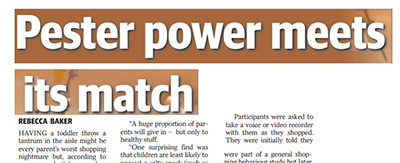Parents stand strong as ‘pester-power’ loses its punch this Christmas
By Annabel Mansfield
 BUSINESS AND LAW Research by UniSA has found that while 80 per cent of children asked for something on the weekly shopping trip – and did so every four or so minutes – parents denied an overwhelming 76 per cent of requests.
BUSINESS AND LAW Research by UniSA has found that while 80 per cent of children asked for something on the weekly shopping trip – and did so every four or so minutes – parents denied an overwhelming 76 per cent of requests.Heading into Christmas, every parent is acutely aware of the ‘power of pester’: the constant asking, niggling and whining that kids typically turn on at inconvenient times.
 The Sunday Mail 8 December 2019
The Sunday Mail 8 December 2019Starting with a small ask and occasionally rising to a full-blown tantrum, most parents have experienced the behaviour firsthand while others have most likely seen it. But how often does pestering occur and how are parents handling it?
According to UniSA research, Australian parents are faring very well, with just over half of all shopping trips occurring without any challenging behaviours from children. And when requests do occur, less than 20 per cent of parents cave in.
Lead researcher, Dr Bill Page, says the finding is a good sign for parents heading into the holiday season.
“Christmas is a time when families spend lots of time together, which often means the kids need to accompany parents on the weekly shopping trip,” Dr Page says.
“Parents often cringe at this thought, especially if they’ve had to endure a child’s tantrum at the shops in the past.
“Yet, despite the narrative about parents feeling relatively powerless in the face of children’s nagging, our research shows otherwise, with most parents holding their ground when it comes to pester-power.
“We found that while 80 per cent of children asked for something – and did so every four or so minutes – parents denied an overwhelming 76 per cent of requests, showing that children’s pestering is perhaps not as powerful as is often thought.”
Documenting behaviours of children aged under 14 years in a grocery store setting – a context where pestering is likely to be at its strongest – children’s behaviours were recorded via spy-camera sunglasses, or lanyard audio devices, and supplemented by survey data. 1839 requests over 89 shopping trips were recorded, with challenging behaviours, recorded via the Eyberg Child Behaviour Inventory.
“Being able to negate difficult behaviours such as pestering is all part of a parent’s job, and to be fair, also a part of a child’s development as they learn to express themselves and practice communication and negotiation skills,” Dr Page says.
He says there are a number of things parents can do to make shopping with children less painful:
- Kids love having a job to do. If you can devise a useful task, such as pushing the trolley or ticking items off a list, they’ll feel more involved and interested.
- Visit the free fruit station. Supermarkets don’t give out free fruit to kids because they’re good people but because they want to build a fresh food image and want you to stay in store longer. A healthy snack might give you the time to complete the shop with minimal fussing.
- Take things to distract. Difficult behaviour often arises when kids are hungry or tired. If you have a book, toy or something to eat on hand, you might be able to stretch their patience until the shop is done.
- Just say no. You probably already do this, but delaying or distracting tactics can help. Remember you are in charge, not the kids.
- Don’t be afraid to cut a trip short. If it’s all going pear-shaped, sometimes it’s best to just cut and run. Go home, have a cup of tea and try again another time.
“With the shops already primed for Christmas, parents are no doubt experiencing pestering behaviours already,” Dr Page says.
“Hopefully, even knowing that parents are all in this together is comfort enough to carry you through the silly season. Kids will be kids, and parents will be parents – together, let’s all hope we can all stay on Santa’s good list.”
Other Stories
- Researchers close to ‘cracking’ cure for peanut allergies
- Trump’s twisted tweets add to his popularity
- Parents stand strong as ‘pester-power’ loses its punch this Christmas
- Experience 2050 today at new MOD. exhibition
- From the Vice Chancellor
- Achievements and Announcements
- Antarctic ice sheets could be at greater risk of melting than thought
- Student design to feature in Greenpeace campaign
- UniSA delivers high-impact innovation for grain cropping in Australia
- Submariners to benefit from UniSA’s deft design research
- Fab four set to soar with New Colombo Plan scholarships
- The latest books from UniSA researchers
- Staff service awards and other key events
- Relive the Hawke Centre’s latest events




